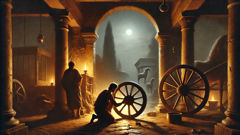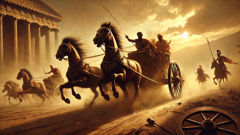Introduction
On the slopes above the Peloponnese, where wind and sea meet the bones of ancient stone, the story of Pelops begins not with a crown but with an exile. He carried the name of a troubled house: son of Tantalus, kin to curses and broken promises. Yet when travelers spoke of Pelops in the marketplaces of bronze-age towns—where the language of prophecy and hospitality crossed like travelers at an inn—they did not only whisper of family sin. They told of his youth, of a man cast out and remade by hunger for a bride and a kingdom, and of the slow, stubborn hope that can take shape in one determined soul.
Hippodamia stood at the center of that hope. Daughter of King Oenomaus, she was both prize and pawn in a cruel contest. Her father, driven by a speech and an omen, made a challenge of marriage: suitors must race his chariot; if they lost, they died. For years the contest had bled the countryside. Statues at crossroads recorded the empty names of those who had loved and failed. Oenomaus, sitting always on the edge between grief and dread, trusted his chariot like a loyal god—horses that could fly like the heartbeat of the land. Yet destiny, as the old women of the coast would say, moves in turns no man can fully command.
Pelops arrived in those shadows with stories of his own fate and with a secret in his breast. The gods had never failed to rearrange the lives of mortals when they were reminded of old debts. Poseidon, who once loved Pelops in his youth and gifted him a horseship, remained a presence in the murmured prayers of sailors and youths. In some versions, a shoulder of ivory marked Pelops as different, a living sign of how gods and mortals intertwine in the shaping of a single life. In others, survival was simply the stubborn cleverness of a man offering himself to a perilous promise. What matters in the telling that follows is less the exact shape of divine favor than the way favor and betrayal braided together to change the fate of a house and the land beneath it.
This is a tale of speed and silence, of metal and oath, and of how one race, held at the threshold of a king’s fear, became the hinge that swung an entire dynasty. It is a story of chariots that thundered like rolling storms, of whispers in stables, of a pact struck under the shadow of an altar, and of a betrayal that carried the heavy, mournful echo of consequence down through generations. Hold the breath, then follow the wheel—this is the legend of Pelops.
From Exile to Oath: Arrival, Allies, and the Weight of a Promise
Pelops' path to contest and crown began in exile and rumor. The man who would challenge King Oenomaus did not arrive as a polished prince on a heralded day; he came with the quiet patience of someone who had learned to carry ruin and to turn it into preparation. Stories braided around him: that he had been cut from the table of gods and served before the immortals; that his flesh had been replaced by ivory; that Poseidon, stirred by a memory, sent horses that smelled of salt and sea foam. Whether such miracles were true in the literal sense mattered less than the truth they offered: Pelops carried a fate that the winds could touch.

He traveled through market towns and olive terraces, and at each hearth he stopped to speak with seers and sailors. Many told him the same underside of the same story. Oenomaus, ruling in Pisa with a madness of protection, had lost his beloved wife and feared a prophecy that his son-in-law would be his undoing. He made a covenant that was both a riddle and a sword: suitors would race him, and their heads would become stones on a pathway to his palace should they lose. The land had grown used to monuments that marked the end of lovers. Meanwhile Hippodamia, wise in the hollow way of those raised at the center of a king's fear, watched suitors die without the power to change her fate. There was a quiet ferocity in her that Pelops would recognize: she was both prize and prisoner, and the two roles breathed into her a terrible dignity.
Pelops sought not merely to triumph but to reshape the terms of the contest. He knew brute speed alone might not be enough. Oenomaus' chariot was famed—axles greased with ritual, horses bred for the gods. To challenge such a thing required alliance and cunning. Pelops therefore considered the two known currencies of the age: divine favor and mortal cunning. In the dim temple precincts where votive horses hung like frozen prayers, he offered up his hands—his hunger, his oath—to whichever power might tilt the road in his favor.
His first ally came by way of charm and memory: Poseidon, the god of horses and waters. For reasons both mortal and divine, Poseidon had once gifted Pelops magnificent bronze-hooved horses that drank moonlight and ran as if the sea itself followed them. These horses, in certain tellings, were the very instrument of Pelops' victory; in others he used them as bait to gain the loyalty of men. Either way, the image mattered: a young man with the scent of salt on his skin, riding beasts whose manes looked like waves, arriving at a king's gate where terror had long held sway.
Yet gods move in moods. Even with noble steeds, Pelops needed a mortal accomplice to prize open Oenomaus' fate. That man was Myrtilus, the charioteer of Oenomaus. Myrtilus was a figure made of contradictions: clever by trade, loyal by oath, but also a man whose loyalties could be bought by grief or desire. Pelops approached him not with coin alone but with a promise that spoke to the charioteer's own secret wishes. Pelops promised Myrtilus a reward that would unmake the old king's iron control—wealth, perhaps, or the hand of a favored woman, or the simple release from a life of servitude—if Myrtilus sabotaged the chariot of Oenomaus. In many versions of the myth this bargain is the hinge of everything; in some it is a negotiation of necessity. Myrtilus, whose loyalties had been eroded by years at the king's side, accepted.
The sabotage itself was a quiet thing in a noisy world. On the night before the race, a hinge was weakened; a lynchpin greased or removed; straps that kept the wheel true loosened in the oil of treachery. Pelops and Myrtilus spoke in the moonlight, not like conspirators of a sordid play but like people who had been given a second chance to alter a ledger of death. Pelops offered Myrtilus a solemn oath: when the race was won, Myrtilus would take that reward and leave with honor. For Myrtilus, the temptation was not simply of gold but of being the author of a myth, of shifting the axis of a king's cruelty.
But the world of myth is not a tidy ledger. Oaths in that age could bind the very bones of men, and promises wrapped in the warmth of friendship could chill into curses. Pelops' bargain was entered into under the shadow of altars, where the names of gods were murmured as witnesses. The thought of Hippodamia waiting at the finish line—her face like one of the carved reliefs in temples, both fierce and sorrowful—pushed Pelops beyond hesitation. He thought of future harvests, of alliances that would be sealed when the race was won, of the stability that a new marriage might bring to a land tired of funerary monuments.
When the morning of the race came, the plains outside Pisa were filled with a hush that felt like an animal about to pounce. Villagers lined the track, children holding little clay horses; priests drew patterns in the dust, offering brief prayers to all manner of powers—Zeus, Poseidon, and lesser local spirits who delighted in the smell of horses. Oenomaus stood on his chariot wrapped in a king's dread and a king's armor, horses steaming, his eyes hollow with the knowledge of ruin. Pelops, mounted on the horses that smelled faintly of salt and foam, felt the whole future arranged in the feel of the reins. Myrtilus took his place, a man whose hands would hold the turning point between death and dynasty.
The race itself was thunder and prophecy, a despairing chant and a bright clean violence. The wheels bit dust, the chariots leaned as if the land itself conspired with them. Oenomaus, confident and terrible, charged like an avenging wind. For a stretch, the race was a technical masterclass: wheel against wheel, skill against skill, the track itself becoming a history of heroism. Then, where speed met fate, the sabotaged axle gave way. Oenomaus' chariot shuddered, buckled; in the tumble of bronze and flesh a king met the ground and with his last breath surrendered both the power to hold his daughter and the life he had used to command fear. The field that had once been littered with the names of the dead added one more—Oenomaus—and the people who had come to watch saw both the end and the beginning: an old tyranny collapsing and a new possibility breaking open.
The bargain's winning was not clean. Myrtilus, having fulfilled his side, let a certain hunger rise in his heart: the reward promised became an object of struggle. Pelops, new to power and fearful of old curses, feared that promises to a servant might turn into claims upon his throne. In the shadows of victory, men count their safety more than their oaths. The ending of one bargain led to another: Pelops, either convinced by counselors or by his own desire to secure the throne, pushed Myrtilus from a cliff into the sea, a deed that stained the hands of the new king with blood and cursed the line that would follow. Myrtilus' dying words, if the sea could carry them, turned into a curse that would ripple through Pelops' descendants, shaping tragedies yet to come.
So the oath that won the bride was both instrument and poison. Pelops took Hippodamia's hand and, for a time, the land relaxed its grief into rejoicing. Yet in the bones of the house there lay an ache: a bargain struck in moonlight that had been answered in blood. The victory was complete in the immediate count: a marriage, a new seat, a dynasty beginning its slow, crooked path. But the myth warns: the way a crown is taken often seeds the sorrow of future kings. Pelops' victory was the kind that travelers tell and seers remember; it was the sort that reminds the listener that human cunning and divine favor are two blades that cut in opposite directions, and that every triumph might carry its own ruin like a shadow.
Wheels of Fate: The Race, Betrayal, and the Echo of a Curse
The day Oenomaus died the plains remembered the sound for years. It was the crash of a king's hubris meeting the simple arithmetic of a broken axle. For the people who watched, it felt like the world had shifted on a hinge you could not see until it had already turned. Pelops’ name, once carried in whispers, swelled into proclamations. Priests recited hymns of deliverance; mothers invoked the new king as an answer to their long nights of fear. Yet among the crowd, in the corners where rumor simmered, some felt the taste of ash. They had seen a promise undone by violence, and they knew how promises, like seeds, can take root in long and dangerous ways.

After the race came the official marriage—Hippodamia's hand, a royal bed, the songs of a new house. Pelops, though triumphant, carried a private restlessness. He had not only taken a wife but had stepped into a role previously maintained with iron and fear. Where Oenomaus had held power through a ritualized sequence of death, Pelops sought to convert terror into law and into alliance. He sent envoys to neighboring rulers, married his kin into local families, and celebrated the harvests with genuine hope. The land blossomed in a way that seemed, at least for a season, to fulfill the promise of a more humane reign.
Yet a human act of treachery rarely ends without vengeance. Myrtilus, whose role in the sabotage was decisive, did not leave with the simple honor he had been promised. Some say that, drunk on the thrill of having reshaped history, he hinted at the deal he had with Pelops in moments he should not have. Others say he demanded his reward in the rawest terms: portions of land, titles, or an intimate claim that would have unmade the marriage Pelops just secured. In any case, the clash between Myrtilus and Pelops took place away from the court’s bright altars and into darker places where the outlines of guilt are sharpest. Pelops, fearing the unsettlement that Myrtilus represented, cast his charioteer from a cliff, and the man died cursing the house he had helped to build.
Myrtilus' curse was not merely an angry speech. In the mythic imagination, a dying vow uttered in the teeth of injustice can hold the weight of destiny. As Myrtilus fell into the surf, his mouth formed an oath that the descendants of Pelops would be troubled by rage, misfortune, and the language of revenge. In generations to come, the house would bear tragedies that fed into one another—brothers who could not love, sons who killed fathers, a palace where kindness turned brittle. The curse would knit itself into the soil of the family, and Homeric echoes would find the bloodline of Pelops recurring in cycles of violence and retribution.
These later tragedies—Atreus and Thyestes, Agamemnon and Orestes—stand as the somber footnotes to Pelops' initial triumph. It is tempting to look at those later scenes and brand Pelops' act as the original crime, as if power always requires a founding betrayal. Yet the myth is more subtle. Pelops did not create cruelty where none existed; he joined a world where cruelty had long been institutionalized. His choice to betray Myrtilus was monstrous, yes, but it was also a symptom of a system that normalized violence as a means to order. The legend uses this ambivalence to teach that the origins of a dynasty matter: the soil in which a house is rooted will color the fruit it bears.
But the myth is also a study in mercy denied and mercy withheld. Pelops’ treatment of Myrtilus is not described as simple survival strategy; the telling often lingers on the human failure of compassion. Pelops obtained a bride and a kingdom, but he paid at a cost that would sharpen into suffering for his descendants. The narrative thus asks a quiet moral question: when men make bargains in the name of love or power, do they remember the names of those they use? And if they forget, who pays the bill? The story yields no tidy answer, because human history rarely does. It offers instead a picture of the fragile chain that joins desire to consequence.
There is also a religious dimension to the aftermath. Pelops’ ascent was marked by temple dedications and by cultic recognition; an oracle once promised that he would lend his name to a region—Peloponnese—whose identity would be anchored to both the glory and the sorrow of its founding. Stories of offerings to gods such as Demeter and Poseidon at sanctuaries in the region suggest that the people tried to assuage both divine anger and mortal guilt through ritual. The rituals themselves took on the colors of the story: processions of oxen, choral songs that remembered the horses, and sacrifices that sought to bind the curse into a form where it might be redirected into protection rather than ruin.
Even beyond the moral and religious dimensions, the Pelops tale functions as a cultural map. It explains why certain laws exist, why some families behave as if haunted, and why the imagery of chariots and horses holds such potency in Greek memory. The race becomes a mnemonic device: a single event that explains a long sequence of legal practices, funeral customs, and aristocratic rivalries. In that way myths are practical. They instruct as much as they enchant; they provide social insurance by embedding warnings in memorable stories. Children learned the tale of Pelops not merely to marvel at a chariot's thunder but to understand that the way one attains power will echo in the actions of sons and grandsons.
Finally, the legend preserves a tragic beauty. Pelops and Hippodamia, for all the drama that swirled around their union, are not simply villain and victim. There are tender moments in the telling: private evenings when Hippodamia and Pelops walked olive groves and spoke of children and harvests; mornings when they set the policy of the land with a patience that contrasted with the violent way they had met. These domestic scenes are intentional contrasts in mythic storytelling: they let the listener hold both the human warmth of household life and the cold moral questions that produced it. The juxtaposition of intimacy and atrocity deepens the narrative and allows it to endure, generation after generation, as both cautionary tale and human story.
So the race becomes larger than the event itself. It is a turning point that reveals how gods and men collaborate—and collide—in shaping human fates. Pelops’ life after the race is not a simple triumphal arc. It is a complex weave of public success and private compromise. In the long echo of the curse, in the rituals meant to mollify it, and in the stories mothers told to their children, the legend of Pelops remained alive. Each retelling rearranged emphasis and detail, but the core stayed: a man who won a wife through speed, divine aid, and a mortal betrayal; a man whose founding violence threaded sorrow through a line of kings. Such is the music of myth, drawing the listener back to the same refrain until its tones become part of the culture's own blood.
Conclusion
The legend of Pelops endures because it contains within itself the contradicting elements that make a story memorable: the thrill of a chariot's speed, the tenderness of a newly married household, the coldness of a bargain betrayed, and the long, aching echo of a curse. Pelops’ ascent to power shows how a single choice—made in fear or hope, in cunning or desperation—can reach beyond a single generation and shape the moral weather of a whole family. It also reminds us that the gods in Greek myth seldom act as simple benefactors; they lend a hand that often complicates human longing, nudging the world into new arrangements that test human virtue. In the telling, Pelops is neither absolved nor damned by his victory. He is human: capable of love and cruelty, of cleverness and misjudgment. The races we run in life, the bargains we strike in moonlight or in public, leave tracks. Sometimes those tracks lead to harvest; other times they lead to a long string of tragedies that future generations must interpret and survive. For listeners today, the story offers a living lesson about the price of power, the fragility of oaths, and the need for mercy where ambition tempts the heart toward ruin.













